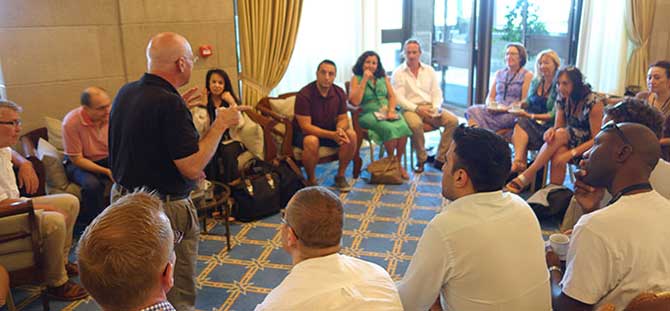

ICICTE 2018 will seek to address the many challenges and new directions presented by technological innovations in educational settings. With the keynote speaker, plenary sessions, workshops, and forums examining the integration of technology into all facets of education, the conference will provide participants with a forum for intensive interdisciplinary interaction and collegial debate. Those attending ICICTE 2018 will leave with an excellent overview of current thinking and practices in applications of technology to education. Thematic streams will include alternative processes, procedures, techniques and tools for creating learning environments appropriate for the twenty-first century.
General conference themes include:
- Pedagogy in the evolving tech environment
- The architecture of learning; accessibility; the evolution of the classroom
- Instructional design and delivery; evaluation and assessment
- Strategies and tools for teaching and learning, simulations and gaming
- Informal, non formal and formal adult education
- Multi-grade education
- Open/Distance learning
- Impacts on educational institutions: effects on faculty, staff, administration, and students; curriculum and program development
- Teacher training
- Building communities of teachers/educators; cooperative learning
- The internationalization of institutions and of education
- Political economy and educational technology: Intersections
- Effects on training institutions and industry
- Ethical considerations in the use of information technology in teaching and learning
- The use of technology in education to promote democratic ideals, freedom, equality.
- Arts education.
ICICTE 2018 is also inviting participants to submit papers related to the following special themes chosen specifically for this year's conference:
Technology in creative arts education
Technology is embraced by all aspects of arts education, from graphic and fine arts, to music and dance. It allows students to explore worlds they cannot access physically because of distance or expense, enables students to interact with others from around the world for collaborative work and helps students with disabilities to participate in arts activities which they would otherwise find difficult to do. Furthermore technology has become a creative tool in itself, from the synthesis of sound, to the digital creation of art, all the way to 3-dimensional painting in virtual reality. Technology is continually expanding the creative envelope and being harnessed by educators to help to expand the horizons and skill sets of students. This theme explores research into innovative applications of technology within any form of arts education.
Ethics, Human rights and access to open educational resources
Education is a human right, and UNESCO “believes that universal access to high quality education is key to the building of peace, sustainable social and economic development, and intercultural dialogue.” Technology has the potential to offer access to education to people across the world, bridging geographical and linguistic divides. At the same time, the differences between access to technology in the developed and developing worlds means that people in developing countries are potentially falling ever further behind the developed countries, exacerbating the economic divide and presenting increased human rights and educational access issues. As a counterpoint, the collection of data by large technology providers, commonly used to support educational activities (such as Google, Apple and Facebook), presents potential human rights issues in terms of collection and use of personal data - particularly where access to online resources requires participants to sign up for social media accounts. Other issues relate to the dichotomy between open educational access and the need to monetise activities by institutions operating in an increasingly commercial world, and the potential challenges of maintaining IP vs allowing open access. Further details on OER can be found here: http://oerresearchhub.org/about-2/reports/oerrh-ethics-manual/
The application of psychology to learning mediated by technology
Definition: This theme is intended for papers that deal with the science of educational, social, and cognitive psychology and other aspects of psychology as applied to education, instruction, and training. Themes: Under this stream the conference will welcome submission of papers aligned with the following themes: (a) Informing evidence-based decision making in the selection and evaluation of technologies for education, instruction, and training. (b) Understanding the balance between physical and psychological fidelity for learning design that achieves its aims. (c) Can technology-based solutions influence or change personal values, attitudes, and standards amongst learners and if so, how do we know or at least find out?



